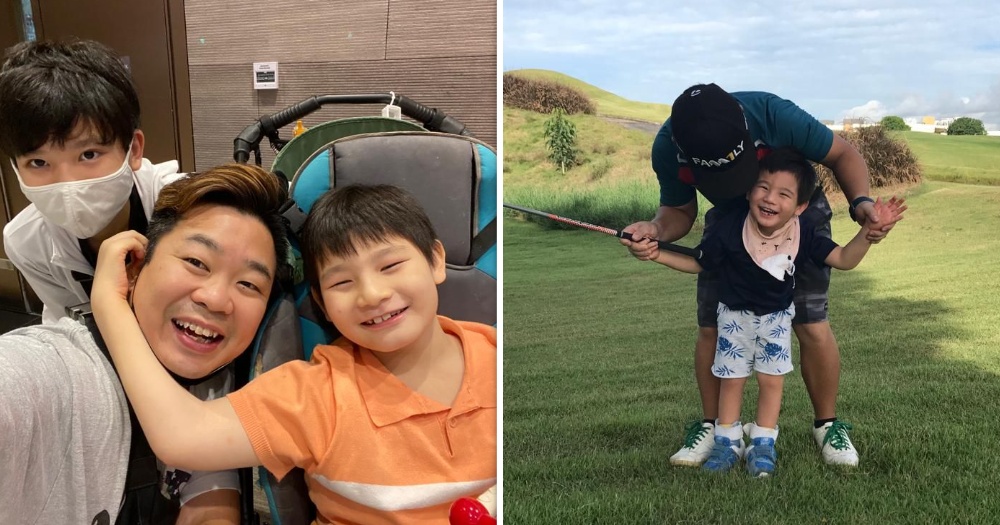Follow us on Telegram for the latest updates: https://t.me/mothershipsg
PERSPECTIVE: "Most fathers want to take up the mandate to give the best to their children. With a special needs child, our world tends to revolve more around them."
Japheth Chong, 37, is a father of three children, aged 11, nine, and 10 months.
His second child, Chace, was diagnosed with Angelman Syndrome – a rare genetic disorder causing delayed development and problems with speech and balance – in 2014.
Chong shares why it's important to him to raise awareness of his son's condition, and reflects on how his son has both challenged and motivated him over the years.
Observing that fathers rarely share about raising a child with special needs, Chong hopes to empower other fathers who are on a similar journey to not give up, and encourage them that they are never alone.
By Japheth Chong, as told to Lean Jinghui
My second son, Chace, was born in May 2013.
Leading up to his birth, my wife and I were pretty excited, and like any father, I was elated when he was born.
Everything was pretty smooth, and in his first year, we had no clue that he might be special. Because he was so cute, and looked so normal right?
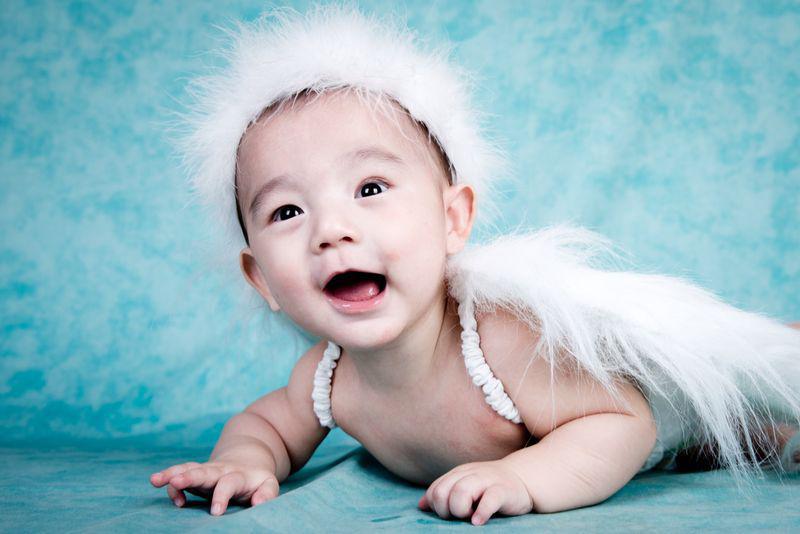 Chong: "Here's Chace at six months old."
Chong: "Here's Chace at six months old."
However, we soon started noticing little things about Chace's development, that was slightly slower than other children's.
Like, feeding was a trouble – he tended to choke on his milk, and his sleeping schedule was not as regulated as number one.
At the age of 12 months, he was also not yet able to crawl, when most kids would have started to walk.
Learning that Chace has Angelman Syndrome
We went through occupational therapy with Chace, but after months of exercises with no results, we started to become agitated and worried.
Somewhere along the line, someone suggested for us to take a DNA test.
I was initially reluctant as we had no family history of special needs, but I finally relented because I needed to know the truth.
I recall when the phone call from KK hospital came, a couple of days shy of Christmas 2014.
We had planned to bring the kids out to Universal Studios Singapore (USS); between me and my wife, it was really difficult hearing such heavy news, and putting on a smile for the kids that day.
In the call, it was revealed that Chace has Angelman Syndrome – a rare neurological and genetic disorder that affects approximately 1 in 15,000 births.
There was a lot of shock and disbelief on hearing that: Like my little kid is "abnormal"? What is this medical disorder? Why is this happening to my family?
At the same time, we were very curious about Angelman, and after Googling furiously, we found that many of the descriptions matched Chace’s behaviour.
From severe sleep disorders, to frequent smiling and laughter, stiff or jerky movements, and no speech abilities... the list stretches on.
Communication through laughter
I think one of the most unique features of children with Angelman Syndrome is that they tend to laugh uncontrollably.
Chace often bursts into laughter, sometimes even as he's sleeping and as he dreams.
As his parents, we've had to learn to identify the different types of laughter – like there’s laughter where he's really happy, because he's nervous, or he's trying to tell you that he's ticklish.
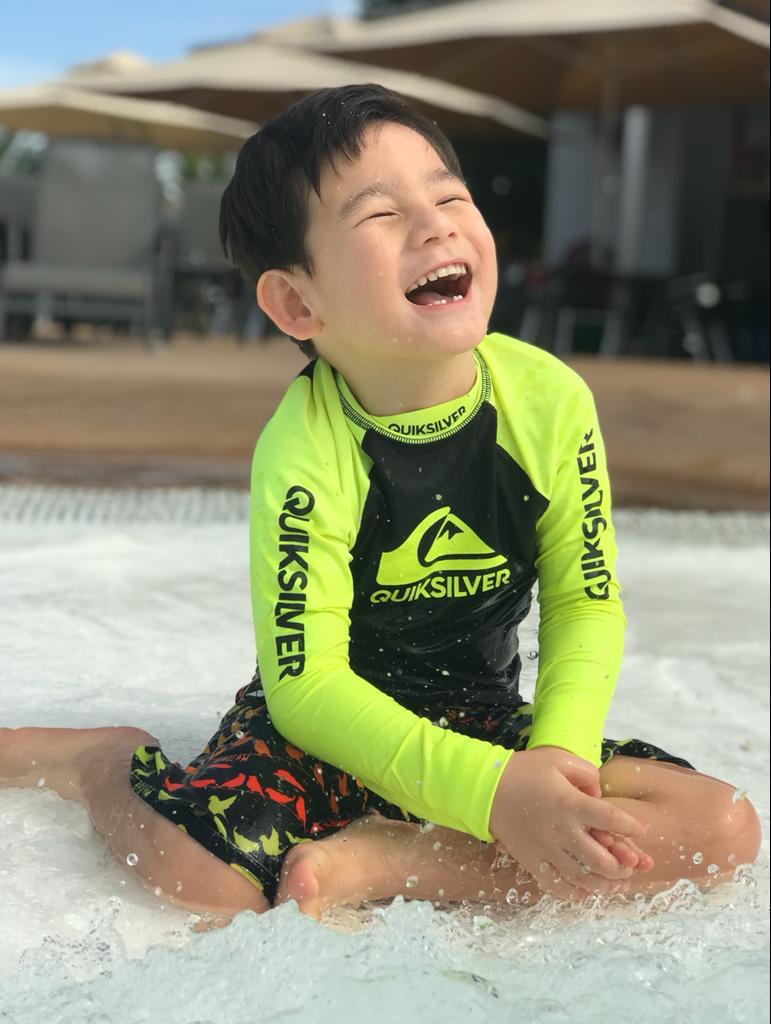 Chong: "Chace absolutely loves water. He is very happy here."
Chong: "Chace absolutely loves water. He is very happy here."
We're sure it's genuine, because he also cries, whines and occasionally gets angry like any other kid.
He just communicates through laughter for a wider spectrum.
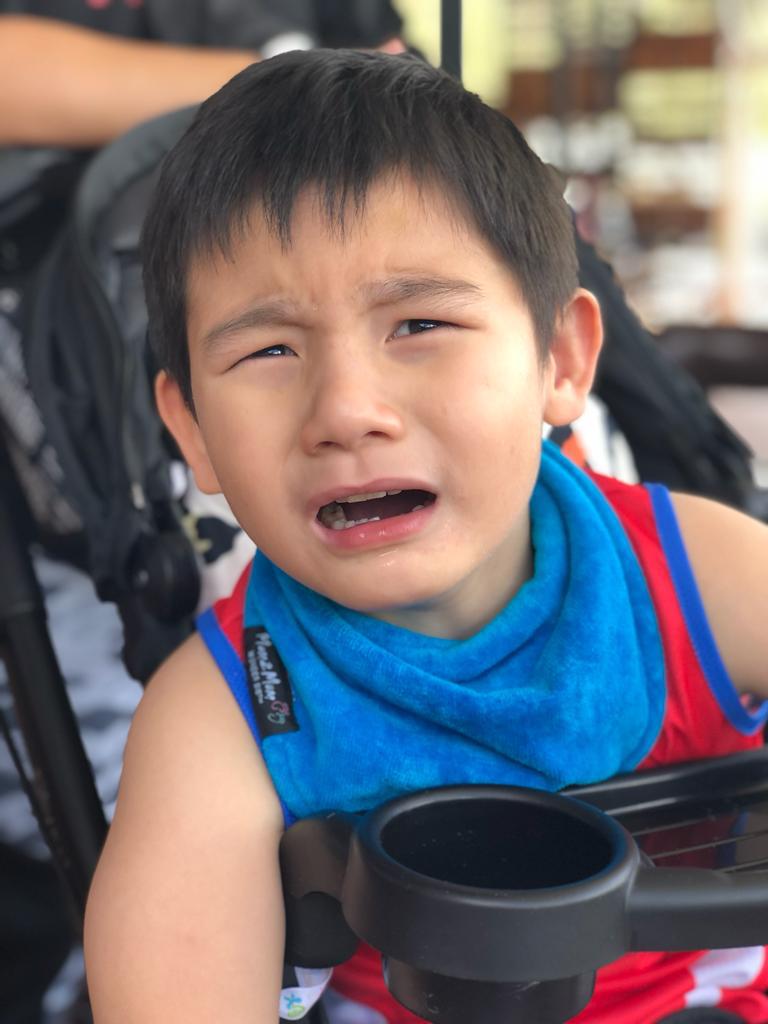 Chong: "Chace gets nervous whenever he needs to sit down."
Chong: "Chace gets nervous whenever he needs to sit down."
Because a lot of his communication is non-verbal, if he wants something or wants your attention, Chace also tends to grab you.
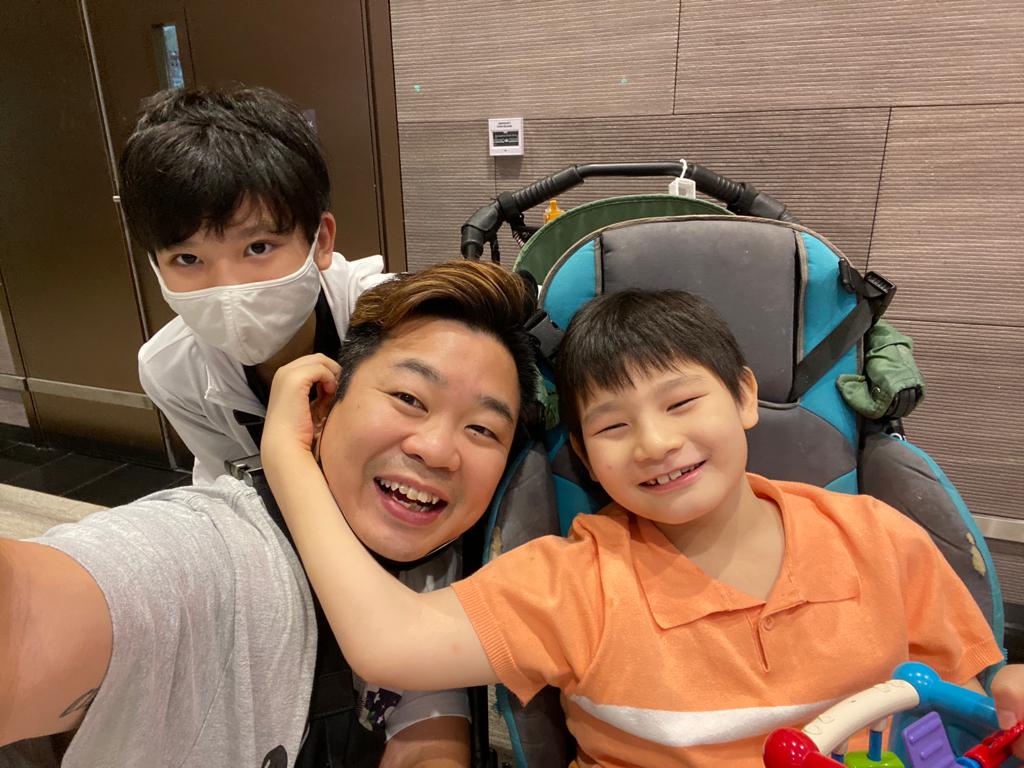 Chong: "Chace at a family outing with his older brother, and me."
Chong: "Chace at a family outing with his older brother, and me."
People often mistake Chace and feel like he's being rough when he does so, but most of the time, this grabbing is really just him saying "Hello," or him wanting you to come closer.
I sleep with him every night, and I've noticed that he'll sometimes sit up and smack my face.
That's just how he lets me know he has pooped, or more recently, that he wants me to cuddle him like a bolster.
Once I wrap my arms around him, I'll hear him snoring again.
Feeding difficulties and seizures
In 2015, when Chace was two, he had a major episode of seizures.
He was foaming at the mouth, and we rushed him to the hospital at 4am in the morning. He had lost movement in the right side of his body, and it took half a day for him to slowly regain that.
The best way to describe him when he has seizures is like a goldfish out of water – his entire body stiffens and he keeps jerking and gasping for air.
We’re always extremely worried because each time it hits, we’re scared it might affect him permanently.
Episodes happen almost yearly, and each time, Chace spends at least a week in the hospital.
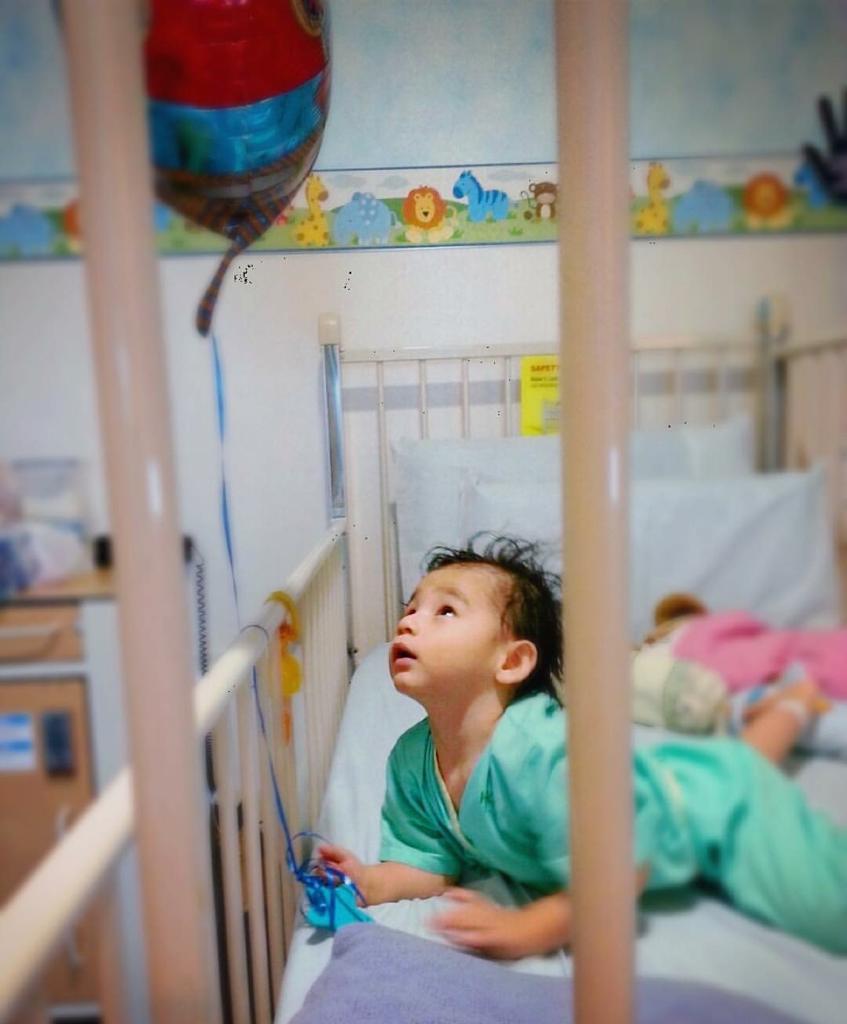 Chong: "Chace at the hospital, after a seizure episode, aged three."
Chong: "Chace at the hospital, after a seizure episode, aged three."
I guess anytime, things could happen, and so we're kinda used to it now.
But no matter how tired I am, I’ve never thought of it as frustrating, as we’ve accepted that having a special needs child means that we have to avail ourselves to many unforeseen possibilities.
There are many medications in the market, so it’s about finding the best combination for Chace.
I’d say feeding him is the most challenging, on both ends lah.
Wherever the spoon goes, he'll just tilt his head, and refuse to open his mouth. Sometimes, he'll even swipe the spoon away.
Feeding him in public is especially difficult, as sometimes the public will also come up and offer parenting advice, like, “Don’t force feed your child”, when they see us trying to feed Chace.
These are the moments I really want to tell them, please try.
I mean, which parent wants to force-feed their child like that, right?
What being a special needs dad has taught me
On the flip side, Chace has given us a lot of energy and courage, and perhaps, identity, as parents.
Once upon a time, my wife and I were really not exposed to this whole idea of special needs.
I was pursuing this perfect life, and questioned why life was so imperfect when Chace happened.
If anything, I now think that Chace is perfect, and that he has revealed the imperfections of my heart.
Over the years, having him has shaped me as an individual – he’s one of the biggest motivations as to why I try to do a little more in life, or pick up skill sets I'm less comfortable with.
Children with Angelman have a similar life expectancy to the average person, so one of my biggest worries is ensuring that Chace has more than enough lifelines after I’m not around.
This naturally affects every area of my life, from how much I want to work and earn, to how far I need to plan for the future.
It’s very hard for a special needs dad to go YOLO, and I’m the sole breadwinner of the family, so I simply try to ration for Chace as much as possible.
I try to be more hands-on, both in parenting and in life.
Being self-employed, I’ve also had to learn a lot of things like negotiation, navigating work politics, and to be wary of schemes from other people.
But every day when I go home, I look at a boy who has no motive; it's not even like my oldest son who might treat me nice just because he wants the latest gadget.
Chace does not have that, he is who he is. No pretence, no motive.
That notion itself, I don't quite know how to put it, is almost like a detox. I feel very safe.
One of my favourite memories with Chace is very simple: When I run with him, he’ll always turn back and check on me.
Sometimes he’ll put his arms up for me to tap, then put them down again. He just wants to make sure I’m there.
Rethinking expectations
I am writing this article from the perspective of a father, because generally, I feel that fathers are less communicative of their fears and desires, and might sometimes struggle alone.
When Chace came along, he challenged us on all fronts, and I did not know who to turn to for help.
Traditionally, a father is expected to be the provider of the family – the breadwinner, emotional pillar and mental support of the home.
I find this a tall order, and I think falling short may cause a father to feel battled on his confidence, and become overwhelmed without safe channels to release stress.
I do think that dads, if possible, should have the privilege of enjoying their kids emotionally, and be emotionally vulnerable with them as well.
I’ve always been very transparent to my kids about my feelings, whether I’m angry or sad.
I tell Chace many things. While I don’t know whether he is listening to me, there are moments when he’ll pat me on the face before moving away, if he sees me cry.
Brief moments like this mean a lot to me, and it’s something I look forward to as a dad.
I always wish that we will be the first people the kids come back to confide in, and we can be their safe haven for anything.
I hope for a meaningful relationship with my children throughout my life.
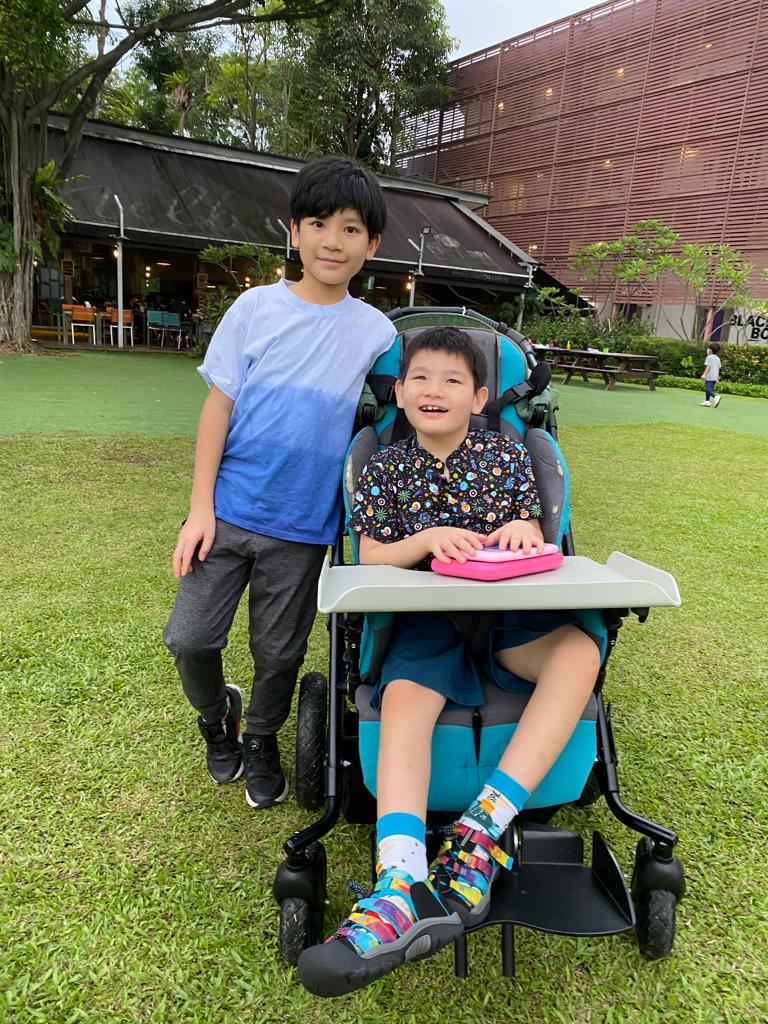 Chong: "A recent photo of Chace and his older brother, Clayton, at Cafe Melba."
Chong: "A recent photo of Chace and his older brother, Clayton, at Cafe Melba."
People can be more empathetic to the special needs community
As a dad, my greatest wish for Chace, is for him to live life safe, and be happy.
I hope he can enjoy life like any other children out there.
As a parent, I want to raise awareness for the special needs community, so eventually people will be more empathetic when they see meltdowns or "noise" that may disturb them in public.
During the pandemic, Chace was always unmasked when he went out, and we often got death stares from people around us.
Some restaurants were also not too kind – the owners would stand at the side and stare, perhaps because Chace is always on a very big stroller, like a wheelchair equivalent, which takes up space.
I understand curiousity, but long stares with judgemental eyes are not ideal. Perhaps be proactive to help if you see a need, or ask what you can do.
Be more vocal in terms of supporting this group of individuals. Especially if they’re non-verbal like my son, as it’s often hard for them to communicate on behalf of themselves.
Luckily, there hasn't been a personal experience of bullying, but I'm worried naturally, for Chace in the future.
I'm hoping increased awareness and inclusivity will help more people stand up for this group, and treat them with kindness.
Like, “It's okay to be slightly different, it’s part of being human, and you’re part of us too."
All images and videos courtesy of Japheth Chong.
If you like what you read, follow us on Facebook, Instagram, Twitter and Telegram to get the latest updates.
